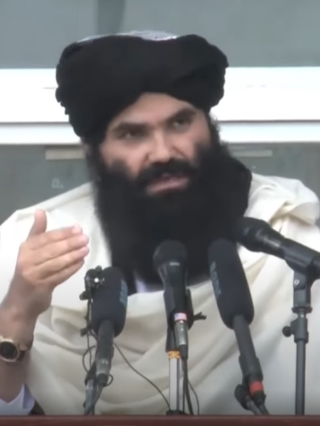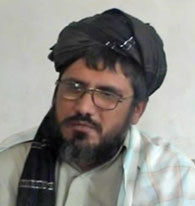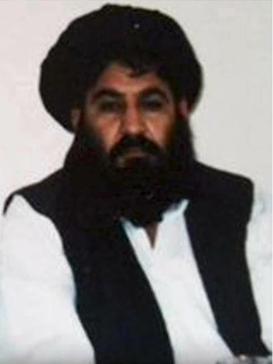
Mullah Muhammad Omar was an Afghan mujahideen commander, revolutionary, and the cleric who founded the Taliban. During the Third Afghan Civil War, the Taliban fought the Northern Alliance and took control of most of the country, establishing the First Islamic Emirate for which Omar began to serve as Supreme Leader in 1996. Shortly after al-Qaeda carried out the September 11 attacks, the Taliban government was toppled by an American invasion of Afghanistan, prompting Omar to go into hiding. He successfully evaded capture by the American-led coalition before dying in 2013 from tuberculosis.

Dadullah was the Taliban's most senior militant commander in Afghanistan until his death in 2007. He was also known as Maulavi or Mullah Dadullah Akhund. He also earned the nickname of Lang, meaning "lame", because of a leg he lost during fighting.

Sirajuddin Haqqani is an Afghan warlord and Specially Designated Global Terrorist who is the first deputy leader of Afghanistan and the acting interior minister in the internationally unrecognized post-2021 Taliban regime. He has been a deputy leader of the Taliban since 2015, and was additionally appointed to his ministerial role after the 2021 withdrawal of foreign troops. He has led the Haqqani network, a semi-autonomous paramilitary arm of the Taliban, since inheriting it from his father in 2018, and has primarily had military responsibilities within the Taliban.

Mullah Naqib Alikozai, sometimes called Naqibullah, was an Afghan mujahideen commander and politician from the Kandahar area of southern Afghanistan. He was the leader of the Alikozai Pashtun tribe.
Maulvi Saif-ur Mansur was a senior Taliban commander.
Mullah Abdul Salam Rocketi is a former mujahideen "freedom fighter" and Taliban military commander who renounced his allegiance to run for the Parliament of Afghanistan in 2005, and for the Presidency in 2009. The Asia Times described him as one of the former Taliban who "... act as the Taliban's political wing in Kabul." Rocketi is an ethnic Pashtun from Zabul Province in Afghanistan. Son of Haji Manzar, he had almost completed his religious studies before he joined the mujahedeen war against the foreign invaders.

Muhammad Rasul was the leader of the High Council of the Islamic Emirate of Afghanistan, a Taliban dissident group in Afghanistan, until the group's dissolution in 2021. He was a Taliban-appointed governor of Nimruz Province, Afghanistan. Rasul exerted pressure and suppression on Pashtun factions unpopular with the Taliban, and made a considerable fortune controlling cross-border drug-smuggling through Nimruz.

The Mullah Dadullah Front was an insurgent group in Afghanistan that claimed responsibility for a series of bombings and assassinations centered in Kabul.
Omar Khalid Khorasani was a Pakistani militant and one of the founding members of Tehreek-i-Taliban Pakistan (TTP). In 2014, he formed his own splinter militant group called Jamaat-ul-Ahrar (JuA) and was ousted by the Mullah Fazlullah-led Taliban. The same year, JuA swore allegiance to Islamic State (ISIS), however, a year later JuA rejoined TTP.

Jamaat-ul-Ahrar was a terrorist organization that split away from Tehrik-i-Taliban Pakistan in August 2014. The group came to prominence after it claimed responsibility for the 2014 Wagah border suicide attack. In August 2020, it merged back to TTP.

Akhtar Mohammad Mansour was the second supreme leader of the Taliban. Succeeding the founding leader, Mullah Omar, he was the supreme leader from July 2015 to May 2016, when he was killed in a US drone strike in Balochistan, Pakistan.

The Sacrifice Front, more commonly known as Fidai Mahaz, was a Taliban splinter group and faction in the War in Afghanistan. It was led by Mullah Najibullah, also known as Omar Khitab, a former Taliban commander.

Najibullah, often referred to as Mullah Najibullah or Hajji Najibullah, and also known by the pseudonym Omar Khitab, is an Afghan militant leader who is the head of the Taliban splinter group Fidai Mahaz in Afghanistan.

Mullah Hibatullah Akhundzada, also spelled Haibatullah Akhunzada, is an Afghan cleric who is the supreme leader of Afghanistan in the internationally unrecognized Taliban regime. He has led the Taliban since 2016, and came to power with its victory over U.S.-backed forces in the 2001–2021 war. A highly reclusive figure, he has almost no digital footprint except for an unverified photograph and several audio recordings of speeches.

Mullah Mohammad Yaqoob Mujahid is an Afghan militant commander and cleric who is the second deputy leader of Afghanistan and the acting defense minister in the internationally unrecognized Taliban regime since 2021. He has been a deputy leader of the Taliban since 2016, and was additionally appointed to his ministerial role after the Taliban's victory over Western-backed forces in the 2001–2021 war. He has been the Taliban's military chief since 2020.
Usman Ghazi was the Emir of the Islamic Movement of Uzbekistan, a militant group based in Afghanistan and Pakistan. He succeeded Usman Adil after the latter's death in a drone strike.

The Islamic State–Taliban conflict is an ongoing insurgency by the Islamic State Khorasan Province (IS-KP) against the Taliban regime in Afghanistan. The conflict initially began when both operated as rival insurgent groups in Nangarhar; since the formation of the Taliban's state in 2021, IS-KP members have enacted a campaign of terrorism targeting both civilians and assassinating Taliban members using hit-and-run tactics. The group have also caused incidents and attacks across the border in Pakistan.
Mullah Abdul Latif Mansour is a politician in Afghanistan. He is currently serving as the acting Minister of Energy and Water, a position he held since 7 September 2021. He is considered a senior leader of the Taliban religious organization.

The Supreme Leader of Afghanistan, officially the Supreme Leader of the Islamic Emirate of Afghanistan and also styled by his religious title Amir al-Mu'minin, is the absolute ruler, head of state, and national religious leader of Afghanistan, as well as the leader of the Taliban. The supreme leader wields unlimited authority and is the ultimate source of all law.

High Council of the Islamic Emirate of Afghanistan (HCIEA) (Pashto: دٙ اَفغانِستان اِسلامي اِمارَت عالي شوریٰ, romanized: Də Afġānistān Islāmī Imārat Ālī Šūrā ; Dari: شُورٰایِ عٰالئِ اِمٰارَتِ اِسلٰامئِ اَفغٰانِستٰان, romanized: Šūrā-yi Ālī-yi Imārat-i Islāmī-yi Afġānistān) was a breakaway Taliban faction active in Afghanistan since 2015. The faction broke away from the Taliban in 2015 following the appointment of Akhtar Mansour as the leader of the Taliban and elected Muhammad Rasul as its leader. The faction was involved in deadly clashes with mainstream Taliban in southern and western Afghanistan, leaving scores of dead on both sides. The Islamic Republic of Afghanistan allegedly provided financial and military support to the faction, however, both the Islamic Republic and the faction denied this. Following the Taliban offensive of 2021 and the fall of Afghanistan to Taliban forces, the group dissolved, and its leaders pledged allegiance to the new government.













